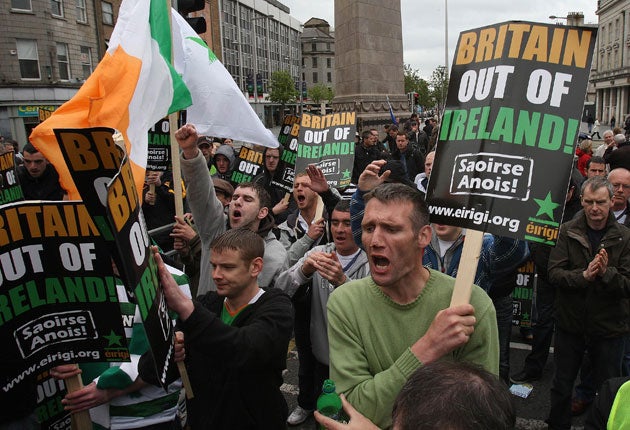Dublin's biggest ever lockdown to greet Queen

The most rigorous security operation ever mounted in Ireland has been put in place in Dublin and elsewhere in readiness for tomorrow's arrival of the Queen on a historic four-day visit.
For several days the streets of Dublin have witnessed large numbers of highly-visible members of the police force. Around 8,000 of them, together with another 2,000 members of the country's defence forces, will be involved in policing the visit.
While the Queen and Duke of Edinburgh are assured a welcome from the majority of the Republic of Ireland's citizens, a number of small dissident republican groups are active and they have made it clear an attack to mark the visit would be a propaganda coup.
According to one report, security has been stepped up after the recent discovery of a dissident attempt to procure missiles and rocket launchers. This, according to the report, prompted British insistence that Metropolitan Police royalty protection officers be allowed to carry firearms during the visit. Irish newspapers have carried photographs of soldiers manning mobile radar apparatus with the clear intention of emphasising that police and troops are ready for anything.
A number of demonstrations are planned by left-wing and republican splinter groups, but will be kept well away from the royal party. Superintendent John Gilligan from the Gardai said: "Where people want to protest they will be allowed to protest, within reason. Gardai are ready if necessary to deal with any issues that arise."
Riot squads will be on standby, together with two mobile water cannons on loan from police in Northern Ireland. Dissidents and hangers-on have previously taken part in street disturbances. Supt Gilligan described it as the biggest operation his force had ever put together, explaining that they will work in two 12-hour shifts, with 4,000 on duty at any time.
Two of the sites will be of particular historical significance. One, the Croke Park stadium, was the location of "Bloody Sunday" in 1920, when troops and police opened fire during a football match, killing 14 people.
The first test of the security measures will come tomorrow when she visits the Garden of Remembrance, a memorial dedicated to "all those who gave their lives in the cause of Irish freedom". More recent incidents will also be marked during the visit, which coincides with the anniversary of explosions that killed 34 people in Dublin and Monaghan in 1974. While northern loyalists claimed responsibility for the bombings, republicans and others allege that British intelligence were involved.
A committee of bereaved relatives yesterday published an open letter to the Queen and David Cameron, who will also be in Dublin this week, pressing for the release of material from unpublished official files. Theresa May, the Home Secretary, said the Queen's visit would inevitably be surrounded by security issues but added that Irish police were experienced in protecting public figures.
Enda Kenny, the Irish Prime Minister, said the Queen would "receive a very warm welcome from the vast majority of Irish people". He added: "The visit of Queen Elizabeth is the start of a new era between both countries, one based on respect and friendship." During the visit the Queen is due to deliver a speech which can be expected to touch on the more sensitive and controversial aspects of British rule in Ireland.
While the Irish are keen that the event will promote tourism, the deeper hope is that it will mark the ending of the Northern Ireland Troubles and signal a new start to Anglo-Irish relations. Mr Kenny said the sites chosen by the Queen for her visit were sensitive and appropriate and would "send out a great message of healing of the past."
Join our commenting forum
Join thought-provoking conversations, follow other Independent readers and see their replies
Comments
Bookmark popover
Removed from bookmarks